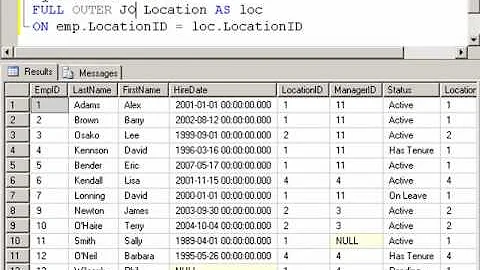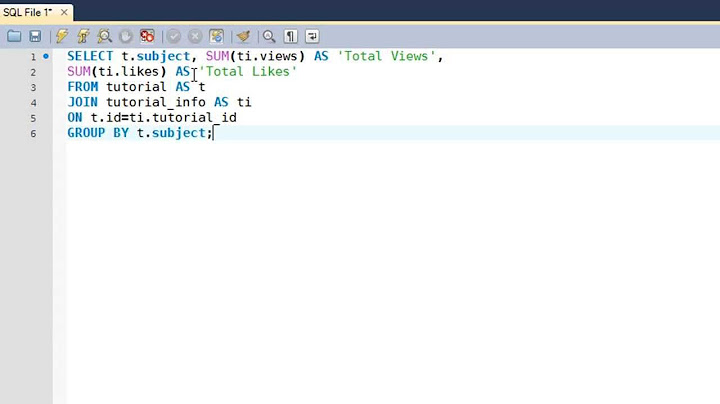Trying to use INNER JOIN and GROUP BY SQL with SUM Function, Not Working
Solution 1
This should work.
SELECT a.[CUSTOMER ID], a.[NAME], SUM(b.[AMOUNT]) AS [TOTAL AMOUNT]
FROM RES_DATA a INNER JOIN INV_DATA b
ON a.[CUSTOMER ID]=b.[CUSTOMER ID]
GROUP BY a.[CUSTOMER ID], a.[NAME]
I tested it with SQL Fiddle against SQL Server 2008: http://sqlfiddle.com/#!3/1cad5/1
Basically what's happening here is that, because of the join, you are getting the same row on the "left" (i.e. from the RES_DATA table) for every row on the "right" (i.e. the INV_DATA table) that has the same [CUSTOMER ID] value. When you group by just the columns on the left side, and then do a sum of just the [AMOUNT] column from the right side, it keeps the one row intact from the left side, and sums up the matching values from the right side.
Solution 2
Two ways to do it...
GROUP BY
SELECT RES.[CUSTOMER ID], RES,NAME, SUM(INV.AMOUNT) AS [TOTAL AMOUNT]
FROM RES_DATA RES
JOIN INV_DATA INV ON RES.[CUSTOMER ID] INV.[CUSTOMER ID]
GROUP BY RES.[CUSTOMER ID], RES,NAME
OVER
SELECT RES.[CUSTOMER ID], RES,NAME,
SUM(INV.AMOUNT) OVER (PARTITION RES.[CUSTOMER ID]) AS [TOTAL AMOUNT]
FROM RES_DATA RES
JOIN INV_DATA INV ON RES.[CUSTOMER ID] INV.[CUSTOMER ID]
Solution 3
Use subquery
SELECT * FROM RES_DATA inner join (SELECT [CUSTOMER ID], sum([TOTAL AMOUNT]) FROM INV_DATA group by [CUSTOMER ID]) T on RES_DATA.[CUSTOMER ID] = t.[CUSTOMER ID]
Related videos on Youtube
Rob4236
Updated on June 28, 2021Comments
-
Rob4236 almost 3 years
I am not getting my head around this, and wondered if anyone may be able to help me with this.
I have 2 Tables called
RES_DATAandINV_DATARES_DATAContains my Customer as belowCUSTOMER ID | NAME 1, Robert 2, John 3, PeterINV_DATAContains their INVOICES as BelowINVOICE ID | CUSTOMER ID | AMOUNT 100, 1, £49.95 200, 1, £105.95 300, 2, £400.00 400, 3, £150.00 500, 1, £25.00I am Trying to write a
SELECTSTATEMENT Which will give me the results as Below.CUSTOMER ID | NAME | TOTAL AMOUNT 1, Robert, £180.90 2, John, £400.00 3, Peter, £150.00I think I need 2 INNER JOINS Somehow to Add the tables and SUM Values of the INVOICES Table GROUPED BY the Customer Table but honestly think I am missing something. Can't even get close to the Results I need.
-
 rory.ap about 10 yearswhat kind of SQL? SQL Server?
rory.ap about 10 yearswhat kind of SQL? SQL Server?
-
-
Rob4236 about 10 yearsThank you so much roryap that worked first time. Now to Understand this!
-
Hogan about 10 yearsThis answer will have
O(n^2)performance, as op. to a group by or over which will haveO(n) -
 rory.ap about 10 years@user3526836 -- You're welcome. I've updated my answer to make it clearer what's going on. Hope it helps.
rory.ap about 10 years@user3526836 -- You're welcome. I've updated my answer to make it clearer what's going on. Hope it helps. -
Hola Soy Edu Feliz Navidad about 10 yearsIndeed, but he was looking for a result, not for performance.
-
 molamola almost 6 yearsThe reason why a.[NAME] is also included is tuples which have those attributes are repeated. Am I right?
molamola almost 6 yearsThe reason why a.[NAME] is also included is tuples which have those attributes are repeated. Am I right? -
user890332 almost 5 yearsThis answer works well when you join within the same table to get a group by within some column in the table for each line in the table.
-
chindirala sampath kumar over 4 yearsThis solution has serious performance issues. Please do not consider this solution.
-
Sade over 4 yearsHow would one optimize the solution, if performance is a factor?
-
Connor Low almost 3 yearsPlease explain your code (even code comments are helpful).

![Bài 3: [Học SQL từ đầu] - Sữ dụng Inner Join, Left Join, Right Join, Full Outer Join, Union](https://i.ytimg.com/vi/-db9i6Kv5CM/hqdefault.jpg?sqp=-oaymwEcCOADEI4CSFXyq4qpAw4IARUAAIhCGAFwAcABBg==&rs=AOn4CLB3CT5XCOi8VH5dWwreBaYU0KpCIA)







